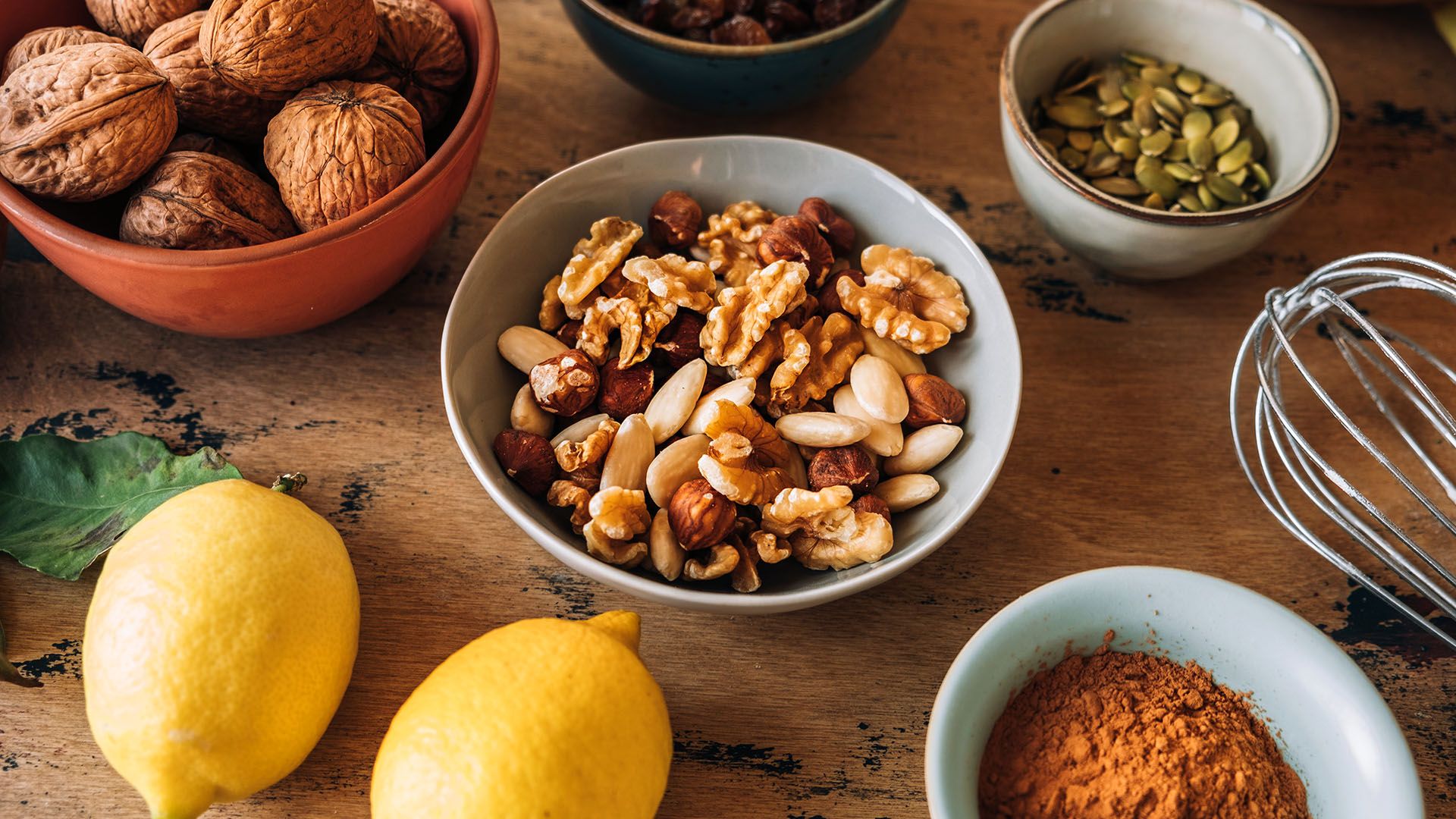What we eat is important at every stage of life, but for women experiencing menopause, consuming a healthy diet — one that’s rich in B vitamins, fiber, probiotics, and other vital nutrients — can make all the difference in mental, physical, and emotional health.
During menopause and perimenopause, decreasing estrogen and progesterone levels affect nearly every system in the body, resulting in symptoms like fatigue, low mood, poor sleep, hot flashes, and weight gain.
Fortunately — in addition to caring for yourself by prioritizing sleep, physical activity, and community — eating certain foods can help to support the production of these hormones and may help improve the uncomfortable symptoms associated with this stage of a person’s life.
Can Food Really Improve Menopause Symptoms?
“Yes, absolutely, and I have thousands of women who attest to this!” says Wendy Sweet, PhD, the founder of My Menopause Transformation, a wellness company she created after experiencing her own struggles with menopause. With her support, many women have found relief from menopause symptoms by adjusting their diet and lifestyle.
Sweet learned through her research about places in the world where, surprisingly, women over 50 are living healthy lives without the symptoms we’ve come to associate with menopause. It’s why she’s a huge proponent of the Mediterranean diet, a way of eating inspired by the cuisine along the Mediterranean coast that emphasizes plant-based foods, healthy fats, and protein through fish and dairy.
Maude Morin, RD, who works with Toronto-based JM Nutrition, says that a well-balanced and nutritious diet can help support hormone production.
“A great first step is to follow the balanced plate model,” says Morin. “This involves building most meals to be 50 percent vegetables, 25 percent protein, and 25 percent whole grains.”
Interested in learning more? Check out The Menopausal Middle Menu Plan
Why Eat Superfoods During Menopause?
Vegetables, protein-rich foods, and whole grains are the pillars of a healthy diet, but consuming certain foods in these categories can help pack an extra punch of vitamins and minerals. We call these superfoods.
“Women experiencing menopause [should] consider eating more food overall, not less, to improve their symptoms and reduce their stress.”
The word “superfood” may have originated in a marketing campaign, but that doesn’t mean it’s not helpful in communicating the added value of certain foods. Simply put, superfoods are whole foods that contain more nutrients per serving than other foods.
6 Superfoods to Try During Menopause and Perimenopause
1. Dark Green Leafy Vegetables
Dark green leafy vegetables like kale, spinach, collard greens, and romaine lettuce are high in B vitamins, particularly B9 (aka folate), which promotes heart health. B vitamins are also required in the production of certain hormones, according to Morin.
“Using estrogen as an example, part of its production relies on B vitamins for energy. B vitamins are found primarily in whole foods like fruit, vegetables, eggs, fish, and seafood,” says Morin. “Vegetables can be eaten cooked, raw, in a soup, as a salad, or more. The possibilities are endless.”
Other, non-leafy veggies that are high in B vitamins include asparagus, Brussels sprouts, broccoli, and green peas.
2. Nuts and Seeds
It may come as a surprise, but Sweet says irritable bowel syndrome (IBS) may occur in as many as one in four women after menopause. Although more research is needed on the connection between hormones and gut health, data shows that more women than men have IBS, and postmenopausal women with the condition have “more severe symptoms than premenopausal women with IBS.”
Morin says one smart way to support a healthy gut is to consume more fiber — and nuts and seeds provide a healthy and satiating choice.
“Some steps to take [to support gut health] are to have adequate hydration and fiber intake. Choosing mostly whole grains, topping breakfasts with seeds, and pairing fruit with nuts for snacks are great ways to get started,” she says. Consider high-fiber options like chia seeds, hemp seeds, pistachios, almonds, pine nuts, and chestnuts.
Some nuts and seeds are also high in magnesium, which is an important mineral related to the regulation of the stress hormone cortisol. Without enough magnesium in the body, it might feel hard to relax. That’s because magnesium helps to remove excess cortisol from the body. Many people opt to take magnesium in a supplement, but nuts and seeds provide a good alternative, and you get the bonus of fiber — and the pleasure of eating these foods. A daily snack of pumpkin seeds is one way to get in a magnesium-rich food, Morin says. Nuts that are high in magnesium include Brazil nuts, cashews, and walnuts.
3. Extra Virgin Olive Oil
Another food that can help to support a healthy gut is one Sweet swears by: extra virgin olive oil. Olive oil is rich in antioxidants called polyphenols, which act as prebiotics in the gut, helping to stimulate the growth of healthy gut bacteria. It also helps to produce gastric acid, which improves digestion. In one study, patients with ulcerative colitis saw reduced symptoms of bloating, constipation, and other gut issues when they consumed olive oil regularly. Another study showed that consuming olive oil reduced gut permeability in diabetic patients.
“One of the main roles of estrogen is to maintain gut lining integrity. Hence, as estrogen levels decline, the gut lining may become ‘leaky,’” says Sweet, referring to leaky gut syndrome, a theory (but not a medical diagnosis at this time) that intestinal permeability is not a symptom but a cause of certain health conditions.
Extra virgin olive oil also helps support a healthy heart, because as a monounsaturated fat, it helps to lower LDL or “bad” cholesterol. EVOO reduces inflammation and has been linked in studies to lower risk of heart disease, some cancers, and dementia, and the vitamin E-rich food may support bone health.
4. Resistant Starches
Carbs are not the enemy! In fact, for women in menopause, carbs that are high in resistant starch — a type of complex carbohydrate that resists digestion in the small intestine and ferments in the large intestine — act as a prebiotic, feeding healthy bacteria in the gut.
Resistant starches play an important role in maintaining gut health, supporting hormone production, and more. They include certain whole grains; beans and other legumes; plantains; and rice or potatoes that have been cooked and cooled. (Cooking and cooling rice and potatoes can increase the level of resistant starch.)
Some resistant starches also contain B vitamins, which are necessary for estrogen production. “In North America, we are fortunate with our wheat-based products, as wheat flour is fortified with B vitamins,” says Morin, adding that chickpeas and other legumes also help to support estrogen production because they contain phytoestrogens.
Sweet says that greenish bananas are also a good source of resistant starch. Whole grains like oats, white and brown rice, and barley are great options, too, as they are also high in fiber.
5. Fermented Foods
Adding fermented foods like kefir, kombucha, yogurt, kimchi, and sauerkraut to your meals will also help to support a healthy gut, according to the experts interviewed for this story. Fermentation is one of the oldest forms of food preservation and can extend a food’s edibility for months. Fermented foods contain live microbes or cultures that strengthen the walls of the intestine, creating a healthier gut.
“Consume probiotic-rich foods: Kimchi, kombucha, kefir, yogurt, sauerkraut, miso paste, and dark chocolate are all examples,” says Morin. “This supports the gut flora, which can impact bloating.”
Other fermented foods include tempeh, apple cider vinegar, natto, and raw cheese.
If you’re thinking of including beer and wine in this category, since they’re fermented beverages, you might want to think again. Alcohol dilates blood vessels and can trigger a hot flash, and there are additional health concerns around what drinking can do to your body, like negatively impacting your energy levels, sleep, and digestion.
6. Salmon
A popular coldwater fish, salmon is one of the most nutrient-dense foods on earth and is a great addition to any diet. High in protein, B vitamins, vitamin D, and healthy fats (including omega-3 fatty acids), salmon is certainly a superfood.
Studies show that eating salmon regularly can help protect against heart disease, the leading health concern for women over 50. This high-protein food may also help with weight management, while the fatty acids present can help to reduce inflammation.
“Many people don’t eat enough of this essential nutrient,” says Morin about omega-3 fatty acids, which have also been shown to slow cognitive decline. If you’re not eating salmon regularly, consider taking fish oil supplements. Omega-3 fatty acids are also present in mackerel, tuna, herring, sardines, flaxseed, chia seeds, and walnuts, as well as certain foods that have been fortified with omega-3, including eggs and yogurt.
Eating Habits: When More Is More
In addition to consuming more of these nutrient-dense superfoods, Sweet suggests that women experiencing menopause consider eating more food overall, not less, to improve their symptoms and reduce their stress.
“Chronic stress causes increased production of cortisol, which is already higher as women move from menopause to postmenopause because the aging adrenal glands produce more cortisol,” she says. “The brain uses up around 25 percent of daily energy, hence, feeling stressed and overwhelmed contributes to the need for more nutrients and calories, not less.”
As we get older and hormone levels begin to drop, it’s comforting to know that superfoods rich in the vitamins required to produce estrogen and other hormones can help us have a smoother transition into middle age. Creating more space for these foods on our plates, especially during menopause, can positively impact mental and physical well-being and quality of life.

